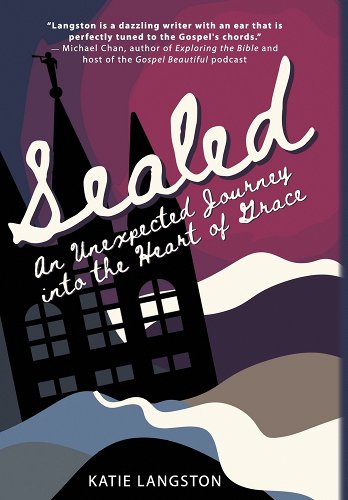One good reason to read about other people’s lives is to learn about their experiences that are different from our own. But another good reason is to learn about their experiences that are the same, because it makes us feel less alone. It is for this second reason that I most enjoyed Katie Langston’s memoir Sealed: An Unexpected Journey into the Heart of Grace.
I’ve blogged before about how I grew up a neurotic Mormon. I worried about being able to keep track of all my many sins so I could properly repent of them all. I worried about impending nuclear war that some people seemed to so gleefully anticipate. But where I was neurotic, Katie (sorry I’m going to be all uncouth and call her by her first name because I know her through the Mormon feminist groups) suffered from full-on scrupulosity, although it wasn’t until she was an adult that she was able to put a name to it. She was so worried as a child that she was sinning and not remembering that she began confessing to her parents about things she was quite sure she hadn’t done, but couldn’t be 100% certain, so it seemed safer to confess and accept punishment than risk letting a sin be forgotten. She writes about how, when she turned eight and the time came to be baptized, she hoped to put it off a little, figuring that if she only got one chance to wipe her slate clean, she shouldn’t be too hasty to rush in and use it up. Unfortunately, by bringing the scheduling question up with her father, she found that she had inadvertently accelerated the process. Although I never thought of this strategy as a kid, I had so much the same line of thinking about sin.

Similarly relating her experience back to mine, where I grew up with parents who were pretty strict about church teachings, hers leaned toward fundamentalism. She was homeschooled for years, to keep her mind safe from the wickedness of secular ideas. Her parents fell into the orbit of anti-government preppers, but fortunately, when some of the most radical among them asked her parents to go with them to Mexico and become polygamists, they declined, and the experience may have pushed them toward finally sending Katie to public school.
Over and over, I so much identified with her stress about her sins. She continued to struggle with scrupulosity while on her mission in Bulgaria. Here’s a passage that I think captures her dilemma perfectly:
The Questions showed no mercy. Every day, they threatened to overtake me with despair; every night, I lay in bed, weeping silently so as to prevent my companion from hearing. I read Book of Mormon passages where characters had profound born-again experiences and felt the Spirit was their guilt away. I wanted desperately to sense something similar. What was wrong with me, that God wouldn’t grant me an experience like that? I had never, for as long as I could remember, felt whole. I’d had moments—an hour or two here, a day or two there—but always The Questions returned, driving me to the brink of what was bearable, urging me to succumb to darkness.
Read More
